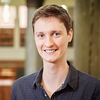
Samuel Perks
- Course: PhD English
What made you want to apply to your PhD course and to Leeds?
My supervisors at my previous universities recommended I work with particular academics at Leeds who are known for their pioneering research and commitment to supervision.
What is it that makes you passionate about your area of study?
Doing original research is exciting and offers great freedom. Choosing your own topic of study, and committing to expanding knowledge about it, is definitely the most exciting thing about doing a PhD. Leeds facilitates that very well.
What aspects of your study did you enjoy the most?
There is a really strong postgraduate community here, and academics take a genuine interest in research students’ work. It’s a supportive atmosphere, which is conducive to completing the research and building towards a career of your choice.
For example, our School has a postgraduate forum, where research students share their work with each other and learn from each other. This regular event is a great way of meeting fellow researchers, too.
What would you say about the learning facilities in your School and at the University in general?
The University recently refurbished one of its libraries to feature a postgraduate-only floor, equipped with study spaces with power sockets, water fountains, and printers and scanners. This is a very useful place to get work done. The School of English also has a dedicated study space in the heart of the School.
What other activities are available for students to take part in outside of their
PhD students get to teach in their departments. The experience of tutoring seminars, marking essays, mentoring students, and giving lectures is something you can build towards, as a researcher, and need not do if you don’t want to. It is, however, a really good experience in developing skills and engaging with students’ ideas.
What would you say to anyone thinking of applying for a PhD in your school?
If you’re sure you want to do a PhD in literary and cultural analysis, Leeds can offer amongst the best atmospheres and amongst the best facilities to help you complete your research and move onwards and upwards.
What do you plan to do now you’ve finished your course, and how do you think the skills and knowledge you’ve developed at Leeds will help with these plans?
I’m applying for jobs in academia, as competitive as these are, and hope to forge a career in education if this becomes unrealistic. Academic and support staff at Leeds have helped me develop as a researcher and teacher, and this means I should be decently-placed when job opportunities arise.

